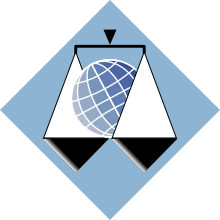
Back المحكمة الجنائية الدولية ليوغوسلافيا السابقة Arabic Keçmiş Yuqoslaviya Beynəlxalq Cinayət Tribunalı Azerbaijani Міжнародны трыбунал па былой Югаславіі Byelorussian Міжнародны трыбунал па былой Югаславіі BE-X-OLD Международен наказателен трибунал за бивша Югославия Bulgarian Međunarodni krivični sud za bivšu Jugoslaviju BS Tribunal Penal Internacional per a l'antiga Iugoslàvia Catalan Mezinárodní trestní tribunál pro bývalou Jugoslávii Czech Det internationale tribunal til pådømmelse af krigsforbrydelser i det tidligere Jugoslavien Danish Internationaler Strafgerichtshof für das ehemalige Jugoslawien German
You can help expand this article with text translated from the corresponding article in Bosnian, Serbian and Croatian. Click [show] for important translation instructions.
|
| International Criminal Tribunal for the former Yugoslavia | |
|---|---|
 Logo of the Tribunal | |
 | |
| 52°05′40″N 4°17′03″E / 52.0944°N 4.2843°E | |
| Established | 25 May 1993 |
| Dissolved | 31 December 2017 |
| Location | The Hague, Netherlands |
| Coordinates | 52°05′40″N 4°17′03″E / 52.0944°N 4.2843°E |
| Authorized by | United Nations Security Council Resolution 827 |
| Judge term length | Four years |
| Number of positions |
|
| Website | www |
| International humanitarian law |
|---|
| Courts and Tribunals |
| Violations |
| Treaties |
| Related areas of law |
The International Criminal Tribunal for the former Yugoslavia (ICTY)[a] was a body of the United Nations that was established to prosecute the war crimes that had been committed during the Yugoslav Wars and to try their perpetrators. The tribunal was an ad hoc court located in The Hague, Netherlands.
It was established by Resolution 827 of the United Nations Security Council, which was passed on 25 May 1993. It had jurisdiction over four clusters of crimes committed on the territory of the former Yugoslavia since 1991: grave breaches of the Geneva Conventions, violations of the laws or customs of war, genocide, and crimes against humanity. The maximum sentence that it could impose was life imprisonment. Various countries signed agreements with the United Nations to carry out custodial sentences.
A total of 161 persons were indicted; the final indictments were issued in December 2004, the last of which were confirmed and unsealed in the spring of 2005.[1] The final fugitive, Goran Hadžić, was arrested on 20 July 2011.[2] The final judgment was issued on 29 November 2017[3] and the institution formally ceased to exist on 31 December 2017.[4]
Residual functions of the ICTY, including the oversight of sentences and consideration of any appeal proceedings initiated since 1 July 2013, are under the jurisdiction of a successor body, the International Residual Mechanism for Criminal Tribunals (IRMCT).[5]
Cite error: There are <ref group=lower-alpha> tags or {{efn}} templates on this page, but the references will not show without a {{reflist|group=lower-alpha}} template or {{notelist}} template (see the help page).
- ^ "History | International Criminal Tribunal for the former Yugoslavia". www.icty.org. Retrieved 21 December 2022.
- ^ Serbia's last war crimes fugitive arrested, Al Jazeera.net, 20 July 2011.
- ^ "The ICTY renders its final judgement in the Prlić et al. appeal case". International Criminal Tribunal for the Former Yugoslavia. 29 November 2017. Retrieved 29 November 2017.
- ^ "ICTY President Agius delivers final address to UN General Assembly". International Criminal Tribunal for the Former Yugoslavia. Retrieved 29 November 2017.
- ^ "UNSC Resolution 1966" (PDF). Retrieved 21 December 2022.
© MMXXIII Rich X Search. We shall prevail. All rights reserved. Rich X Search